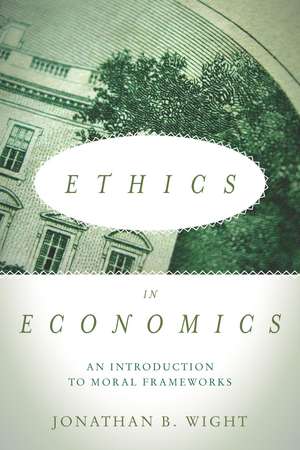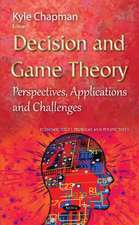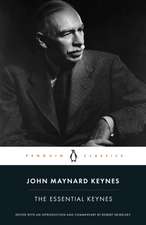Ethics in Economics: An Introduction to Moral Frameworks
Autor Jonathan Wighten Limba Engleză Paperback – 21 apr 2015
| Toate formatele și edițiile | Preț | Express |
|---|---|---|
| Paperback (1) | 241.92 lei 3-5 săpt. | |
| Stanford University Press – 21 apr 2015 | 241.92 lei 3-5 săpt. | |
| Hardback (1) | 830.74 lei 6-8 săpt. | |
| Stanford University Press – 21 apr 2015 | 830.74 lei 6-8 săpt. |
Preț: 241.92 lei
Nou
46.29€ • 48.46$ • 38.30£
Carte disponibilă
Livrare economică 15-29 martie
Specificații
ISBN-10: 0804794537
Pagini: 296
Dimensiuni: 152 x 229 x 20 mm
Greutate: 0.36 kg
Editura: Stanford University Press
Colecția Stanford Economics and Finance
Recenzii
"Wight has written a very readable and, not least due to the use of illustrative examples and fictional dialogues, highly accessible introduction to ethics in economics for economists and students of economics."—Andrea Klonschinski, Ethical Theory and Moral Practice
Notă biografică
Cuprins
Moral norms arising from virtue and duty ethics complement the standard economic welfare model in helping explain economic outcomes and the operation of economic institutions. Both positive and normative economics are enhanced by a pluralist understanding of ethics as a part of critical thinking. Economic solutions usually involve tradeoffs not only between competing normative values but also between competing ethical frameworks of analysis. The Chevy Malibu exploding gas tank case illustrates a case of asymmetric information and moral hazard. In this circumstance, blindly following economic logic, with poorly understood ethical frameworks, can lead to disastrous outcomes. A pluralist approach provides a three-dimensional viewpoint, and better aligns with Adam Smith's moral sentiments model.
This chapter explores the idea that ethics means producing the best outcomes. Individuals in society desire numerous outcomes, including freedom, justice, economic growth, and so on. Various consequentialist theories are examined including ethical egoism, Act and Rule Utilitarianism, neoclassical welfare analysis, and others. The chapter investigates the problems of value and aggregation that are present when using this framework. Jeremy Bentham is a founder of classical Utilitarianism, which seeks to evaluate outcomes using the hedonistic calculus of pleasures and pains. John Stuart Mill elaborates a refined version of this approach. The chapter proceeds develops ideas in historical context and explores their evolution. A critique of these approaches leads to the need for complementary ethical frameworks.
Is winning the only thing that values? Non-consequentialist ethical frameworks arise from principles and virtues that direct behavior yet are not motivated by expected outcomes. These moral frameworks are complementary with outcome based ethics and needed for a good society. For example, the Utilitarian approach provides no protection for individual rights. This chapter explores Kantian ethics, natural rights, and other rule-based systems such as the Ten Commandments. It then explores the difficulties with these approaches and concludes with a discussion of virtue-based ethics in various forms: Aristotle, Confucius, Adam Smith, and Deirdre McCloskey.
Maximizing the economic surplus is the normative outcome that is said to be desirable for the economy to be "efficient." Supply/demand curves are explained to show how they can be used in normative analysis to demonstrate a Pareto optimal market outcome under ideal conditions. The chapter is designed to draw readers inside the graphs to understand how real people are affected by market prices, whether through the consumer or producer surpluses. The normative economic approach to scarcity is shown to be a powerful philosophical idea, yet readers should not forget that efficiency is an ethically laden concept. This chapter is optional for readers with advanced training in economics.
The standard welfare and efficiency approach is sometimes portrayed as uncontroversial and purely scientific. By contrast, this chapter shows that ethical precepts lie at the heart of these topics. Economists have abandoned the notion that voluntary trades are the only basis for reaching efficiency. Cost-benefit calculations rely on the Kaldor/Hicks formulation of potential Pareto improvements and therefore rely on compulsion. As a result, the Buchanan critique is that costs estimates are always somewhat arbitrary. The Kelo eminent domain case and the Three River Gorges dam in China show that the ethical justification for efficiency relies on moral norms and institutions. Economics cannot be a universal science when background circumstances of institutional frameworks (human rights, free press, free exit, and impartial judiciary) are critical for determining the ethical suitability of cost/benefit analysis.
Instrumental views of human welfare conflict with substantive views, particularly in economic development. This chapter explores criticisms of the preference satisfaction approach arising from false beliefs, "polluted" or endogenous preferences, and other factors. If preference satisfaction is a limited measure of human welfare, this leads to different accounting measures of success such as the capabilities approach and the Human Development Index (HDI) of Amartya Sen. It also could imply a role for paternalism in government policies designed to improve substantive measures of well being (e.g., life-expectancy or happiness). The chapter concludes with an appeal for pluralism in evaluating economic outcomes and processes.
Why do societies restrict or ban particular market transactions? In earlier times, "just price" doctrine regulated market activity. Moral limits today arise for at least two distinct reasons (see Michael Sandel): a repugnance at selling particular kinds of goods and services that embody beliefs relating to intrinsic values; and a rejection of market price as an allocation mechanism in particular background circumstances of trade. If intrinsic motivations are important, market prices might crowd out altruistic supply. Considerations of intrinsic value, background circumstances, fairness, duty, and character arise in considering the commodification of bodily organs and other practices, and in arguments for policies such as a living wage, laws against discrimination, and Kantian ethics. Markets are also found to enhance virtues in particular circumstance.
Adam Smith had a profound interest in human sociability. A market economy relies upon self-interested actors, yet economic actors are linked by moral norms that produce self-restraint and trust. This chapter explores the experimental and laboratory evidence for Adam Smith's model. The "Ultimatum game" shows that people routinely incur costs in order to punish others who fail to abide by moral norms. Vernon Smith's "Trust game" shows that moral motive is important in addition to outcomes. Neuroscientists have discovered a mirror-neuron network that mimics fellow-feeling. Paul Zak shows that oxytocin is hormonal basis for social bonding that creates trust and fellow-feeling. Smith's model can be used to explore how and why humans develop a moral conscience, and how moral norms develop and evolve.
A financial panic originating on Wall Street led to the worldwide Great Recession of 2008. The roots of this severe contraction can be found in views promoting ethical individualism, particularly the notion that greed is good for self and society. The chapter traces these ideas back to Bernard Mandeville in the 18th century, and in the 20th century to Ayn Rand and others, including many financial regulators and legislators. Adam Smith denounced Mandeville, and showed that for the invisible hand to work for society's interests, there must be appropriate institutions to channel self-interest in socially beneficial ways. This is particularly true in financial markets, according to Smith. The ethics of Keynesian economics are also examined, as well as the presence of moral hazard arising from private and government incentives.
Justice can be analyzed in different ways, such as through a fair process (procedural justice) or though fair outcomes (distributive justice). Adam Smith was mostly concerned with a fair process, provided by competitive markets. At the same time, he endorsed some measures of distributive justice, such as educational subsidies. When an economic system generates very different outcomes (measured by the gini coefficient), inequality can be a contentious issue. Some inequality is an inevitable or desirable outcome of normal economic behavior. This chapter explores why standard economics moved away from a concern for justice, and instead focused on efficiency. The hypothesis that workers are paid the value of their marginal products continues to hold sway, despite the weakness of its theoretical and empirical foundations.
Procedural justice may ensure equal treatment of adults who compete on the basis of effort and skill. However, effort and skill both depend upon the foundational capabilities developed early in life and on genetics. Factors beyond someone's control, such as parental achievement or sex, influence the limits of education. Distributive justice might suggest that a focus on equality of opportunity for children is a minimum right of citizenship. John Rawls' arguments of justice as fairness are explored along with its critics. Amartya Sen and Martha Nussbaum's capabilities approach builds on Rawls by exploring the distribution of primary goods, but argues that individual differences must be considered in the matter of opportunity. The chapter concludes with a brief introduction to sustainability and intergenerational justice.
Pluralism is the recognition that multiple ethical frameworks can help explain the world and inform decision makers. Pluralism has two aspects: the divergence of theories across domains (vertical pluralism) and the divergence of theories within domains (horizontal pluralism). Ethical pluralism guides the conduct of economic research, in which potential market failures exist because of asymmetric information and free rider problems. Moral hazards are in part addressed by moral norms that rely on duty and virtue ethics. A second case explores how Milton Friedman's injunction for corporate managers to maximize profits for the benefit of shareholders relies on the non-consequentialist moral frameworks of duty and virtue. A pluralistic approach to economics develops stronger critical thinking skills to prepare students for careers of leadership.




















